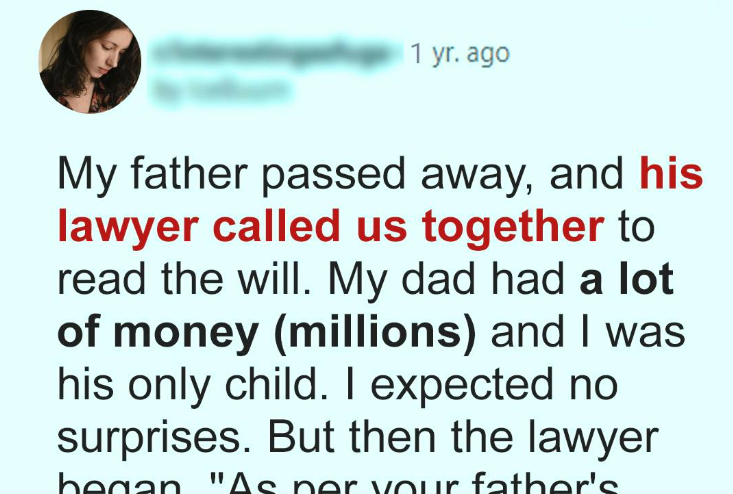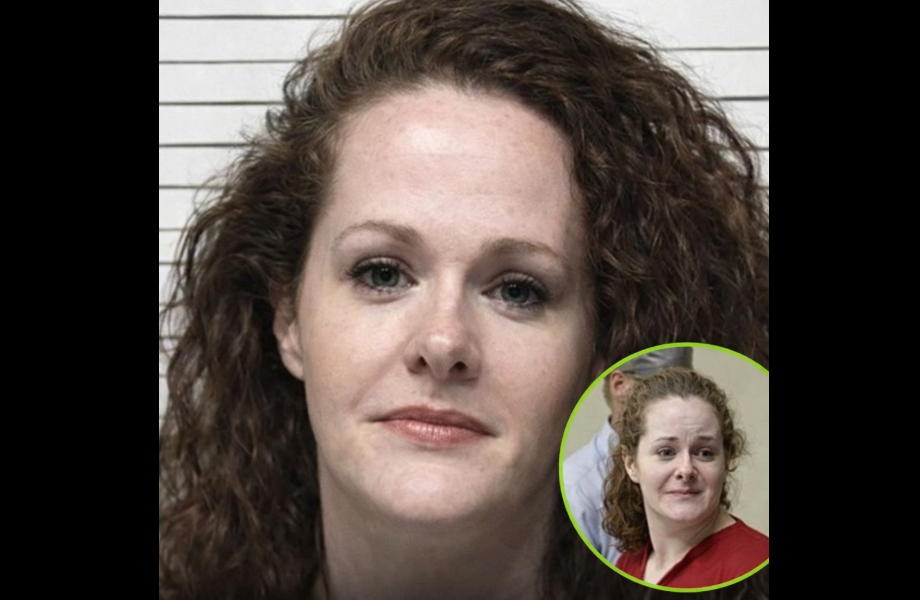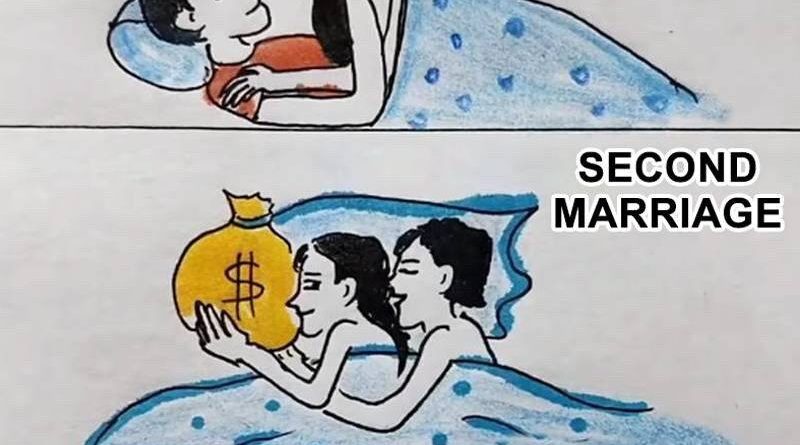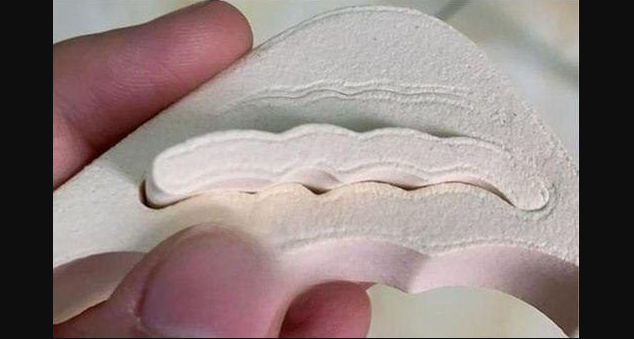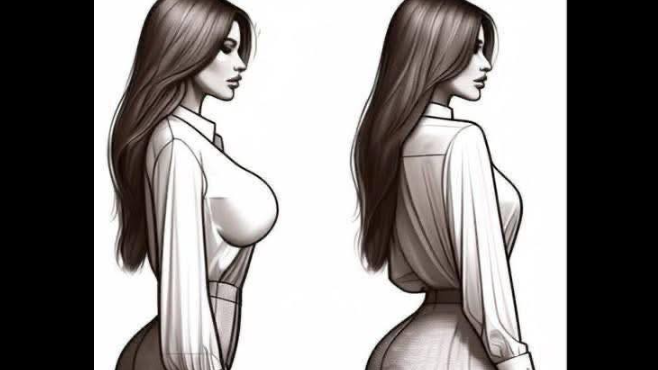My father’s will was supposed to anchor my future. Yet, when the lawyer uttered a name unfamiliar to me, everything shifted. My grandmother’s anger flared instantly. Who was Brenna, and why had my father entrusted her with his entire estate? What hidden truth lay behind his decision?
My childhood unfolded under a rigid framework of expectations. Each dawn, a commanding voice reverberated through our home.
“Hold your shoulders back, Mona. Never slouch. A lady maintains elegance always.”
That voice belonged to Loretta—my grandmother, my caretaker, my constant overseer. After my mother’s passing, Loretta stepped in, molding me in her vision of perfection.
Every detail demanded precision: my academic performance, my posture, even the way I arranged table linens. The effort was draining, but I persisted. I always strove to meet her standards.
When my father died, Loretta’s attention swiftly turned to what she valued most: authority. I vividly recall the day my world transformed. We sat in the lawyer’s office, the air heavy with anticipation.
“You’ll manage the inheritance prudently, Mona,” Loretta declared that morning, already envisioning how we would restore the family’s prestige. “Your father dedicated his life to this.”
I trusted her. Loretta’s certainty had always been unwavering, her strategies flawless. So, in that chilly office, surrounded by the faint aroma of stale coffee, I felt confident about my path forward.
“According to your father’s wishes,” the lawyer began, peering at the document, “his estate, including all assets, is bequeathed to Brenna.”
“Who?” The question slipped out before I could restrain it.
The lawyer hesitated. “Brenna is your father’s other daughter.”
“Sister? I have a sister?”
“Outrageous!” Loretta’s voice echoed sharply. “This is absurd! My son wouldn’t leave everything to a stranger!”
“There’s no error, ma’am,” the lawyer replied calmly. “Your son’s instructions were explicit. Brenna inherits the residence, accounts, and investments.”
“What?” Loretta’s tone escalated to a piercing shriek. “You’re saying this unknown girl gets everything?”
I barely registered their exchange. A sister. A sister I had never known. Loretta’s grip tightened on my hand, pulling me back to reality.
“We’ll resolve this, Mona,” she vowed. “We’ll track down this Brenna and ensure she does what’s proper.”
Her words felt oppressive, but I nodded. Challenging Loretta had never been a choice.
Days later, following Loretta’s directive, I arrived at Brenna’s home. The modest house tilted slightly, its weathered paint peeling like faded memories.
Before I could knock, the door groaned open, revealing Brenna, her smile warm and wide. Her hands fidgeted, fingers intertwining in a subtle, rhythmic dance.
“Hello!” Her voice carried a cheerful, almost melodic tone. “I saw you approach. Did you park near the mailbox? It’s unsteady. I keep planning to repair it, but…”
Her words drifted, her gaze flickering to the doorframe’s edge. She tapped it three times with her knuckles.
“Uh, yes,” I responded, feeling uneasy. “I’m Mona. Your sister.”
“Come inside!” she said brightly, stepping aside without meeting my eyes. “Mind the floorboard by the kitchen—it creaks.”
The house carried a faint scent of clay and soil. A narrow corridor led to a kitchen where a long workbench held half-formed pottery, paint jars, and unfamiliar tools.
Brenna adjusted a collection of mismatched vases on the windowsill three times, murmuring softly before nodding with approval.
Then, as if nothing had occurred, she turned to me, her smile returning. “You’re my sister.”
“Yes,” I said cautiously, unsure how to respond to her warmth. “Our father… he passed recently.”
Her smile remained steady. “What’s it like? Having a dad?”
“It’s… complex to describe. He was gentle. He cared deeply. We were close.”
She nodded, her fingers tapping lightly against her legs. “I never met him. But I have his hands.” She raised her palms, revealing faint clay smudges. “My mom always said so. Big hands, like his.”
Her openness disarmed me. I had braced for hostility or wariness, but Brenna exuded a quiet sincerity.
“Dad left me a gift,” she said suddenly.
“A gift?” I echoed. “That’s… wonderful.”
“Yes. He called it that in the lawyer’s letter. Did he leave you a gift too?”
I paused, Loretta’s sharp words echoing in my mind. “Not exactly. He didn’t…”
“That’s odd. Everyone deserves a gift.”
I smiled faintly. “Perhaps.”
“Stay for a week,” Brenna suggested, her eyes bright. “You can share stories about him. What he enjoyed, what he ate, how his voice sounded.”
“A week?” I asked, caught off guard. “I’m not sure if…”
“In exchange,” she interjected, “I’ll share the gift. It’s only fair.” Her hands twisted together as she awaited my answer.
“I’m not sure I have much to say about him,” I admitted, though the words felt untrue even as I spoke them. “But… all right. A week.”
Her face glowed with delight. “Great. We can have pancakes. Only if you like them, though.”
She returned to her workbench, humming softly. I knew what her “gift” was—the inheritance. Loretta’s plan seemed straightforward. Too straightforward. Yet Brenna’s kindness was already complicating everything.
That week at Brenna’s felt like entering a different realm, one where time slowed and pressures dissolved. Her life was so unlike mine.
Breakfast was no longer a refined pastry paired with a frothy latte. Instead, it was simple—bacon, eggs, and tea served on paper plates.
“Less fuss this way,” Brenna said one morning. “No big cleanup. More time for pottery.”
Her directness, free of pretense, was refreshing yet disorienting.
I noticed her habit of arranging and rearranging plates on the porch rail, ensuring perfect alignment. Each gesture seemed to tell a story of its own.
“Let’s walk to the lake,” she proposed on my second morning.
She kicked off her sandals, leaving them neatly by the porch, and stepped barefoot onto the grass.
“It feels better this way.”
Dew clung to the grass, cool against my feet, as I followed her. She paused occasionally, touching leaves or adjusting a small pile of stones along the path.
Those deliberate actions seemed to ground her, as essential as breath.
At the lake, she knelt by the water’s edge, trailing her fingers through it. “Do you ever sit and listen?”
“To what?” I asked, standing rigidly behind her.
“Everything.”
Brenna’s studio became the center of our days. The air was rich with the earthy scent of clay and creation.
On the third day, she handed me a lump of clay. “Here. Make something.”
My first attempt was a mess. The clay slipped through my fingers, collapsing into a shapeless lump.
“It’s awful,” I sighed, ready to discard it.
“It’s not awful,” Brenna said, her hands guiding mine to reshape the clay. “It’s new. New things need time.”
Her patience astonished me. Even when I spilled water on her workbench, smudging a finished piece, she didn’t reprimand me. She simply cleaned it up.
As I began to relax, free from Loretta’s relentless oversight, her calls grew more frequent. It was as if she sensed my shift, my newfound ease.
One night, her voice cut through the phone, sharp and demanding. “Mona, what are you waiting for? This isn’t a retreat! You need to act. She’s not equipped to handle that wealth.”
I gripped the phone tightly, staying silent as her frustration poured through.
“She’s naive, Mona. Convince her to sign it over. If kindness doesn’t work, find another way. Use her trust.”
Her words stung, clashing with the warmth of Brenna’s world.
“I’m not sure, Grandma. It’s not as clear-cut as you think.”
“It’s entirely clear,” she snapped. “Don’t get sidetracked by her odd habits. Stay focused, Mona.”
I wanted to protest, to say Brenna deserved more than Loretta assumed, but the words wouldn’t come. I mumbled a vague response and hung up. For the first time, I questioned my own intentions.
The next day, Loretta arrived unannounced, her commanding presence shattering the calm. Her heels clicked sharply on the uneven floor as she entered.
“This is where you’ve been?” she snapped, her eyes scanning Brenna’s organized chaos of a pottery studio. “How can you tolerate this clutter, Mona? And you,” she turned to Brenna, “you have no claim to what’s been given to you.”
Brenna froze, her hands trembling as she rearranged vases on the workbench, whispering, “Gift, gift,” to herself.
Loretta ignored her, addressing me. “Mona, stop this foolishness. She doesn’t belong in your father’s legacy. She’s…” Her voice dripped with disdain, “not like us.”
“Gift,” Brenna said louder, pointing to a small cabinet. Her movements grew more intense, her fingers tugging at her apron.
I hesitated but opened the cabinet. Inside lay a stack of worn letters, their edges frayed. Each was addressed to my father. My breath caught.
“What are those?” Loretta demanded.
“Letters from Brenna’s mother,” I said, skimming them. “Did you know?”
Loretta’s face paled, then hardened. “I did what was necessary! Do you think I’d let some woman ensnare my son with a troubled child? When she came looking, I told her to stay away. I wouldn’t let her or her daughter join this family.”
Her words were harsh, and Brenna gripped the table, her eyes wide and fixed on Loretta.
“You fractured this family,” I said, my voice shaking. “You never told him he had another daughter.”
Loretta’s laugh was cold. “He found out! That’s why he changed his will. And now you’re letting her take everything!”
“Dad left a gift,” Brenna said softly. “He wanted me to have it.”
“This isn’t about wealth, Grandma. And I won’t let you take anything more from her.”
Loretta stormed out, the door slamming behind her.
I turned to Brenna. “I’m so sorry. I love you, sis.”
“Want pancakes?” she asked abruptly, as if the confrontation hadn’t happened.
“I’d love some.”
We ate on the porch as the sun sank, casting the sky in warm hues. From that day, we began crafting a life together.
I helped Brenna expand her pottery studio. We fixed the house, adorned it with flowers, and I rediscovered my passion for painting by decorating her creations.
Word spread, and soon customers traveled from nearby towns to purchase our work. Life wasn’t flawless, but it was ours. For the first time, I lived for myself and Brenna, not someone else’s expectations.
